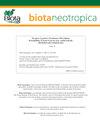巴西亚马逊西南部森林中沃氏棘球蚴潜在野生宿主的发生
IF 1.2
4区 环境科学与生态学
Q3 BIODIVERSITY CONSERVATION
引用次数: 3
摘要
摘要:vogelausch & Bernstein, 1972是新热带棘球蚴病(Neotropical Echinococcus vogeli)的病原体,是一种新热带地区特有的慢性人畜共患疾病。这种寄生虫从丛林犬(Speothos venaticus)传播给它们的猎物,包括低地骆马(Cuniculus paca)和刺鼠(Dasyprocta spp.)。在巴西,新热带棘球蚴病的大多数人间病例记录在亚马逊河流域的阿克里州和帕尔本文章由计算机程序翻译,如有差异,请以英文原文为准。
Occurrence of potential wild hosts of Echinococcus vogeli in the forests of southwestern Brazilian Amazonia
Abstract The helminth Echinococcus vogeliRausch & Bernstein, 1972 is a causative agent of Neotropical Echinococcosis, a chronic zoonotic disease which is endemic to the Neotropical region. This parasite is transmitted from bush dogs (Speothos venaticus) to their prey, which include lowland pacas (Cuniculus paca) and agoutis (Dasyprocta spp.). In Brazil, most human cases of Neotropical Echinococcosis have been recorded in the Amazonian states of Acre and Pará, although few data are available on the occurrence of the potential definitive or intermediate hosts of E. vogeli in the Amazon region. In the present study, we surveyed the forests surrounding 46 human communities located within and around of outside six sustainable-use protected areas in the southwestern Amazon basin of Brazil. The forests were surveyed using camera traps to determine the local presence of potential wild hosts of E. vogeli, and the exploitation of these hosts for game meat was evaluated through interviews with 136 subsistence hunters resident in the local communities. We recorded pacas, agoutis, and bush dogs, as well as domestic dogs (Canis familiaris), all potential reservoirs of Neotropical Echinococcosis, using the same habitats. We also confirmed the frequent consumption of paca and agouti meat by subsistence hunters and their families in the study communities. Our data contribute to the understanding of the occurrence of E. vogeli in Brazilian ecosystems.
求助全文
通过发布文献求助,成功后即可免费获取论文全文。
去求助
来源期刊

Biota Neotropica
BIODIVERSITY CONSERVATION-
CiteScore
2.90
自引率
16.70%
发文量
0
审稿时长
4-8 weeks
期刊介绍:
BIOTA NEOTROPICA is an electronic, peer-reviewed journal edited by the Program BIOTA/FAPESP: The Virtual Institute of Biodiversity. This journal"s aim is to disseminate the results of original research work, associated or not to the program, concerned with characterization, conservation and sustainable use of biodiversity within the Neotropical region.
Manuscripts are considered on the understanding that their content has not appeared, or will not be submitted, elsewhere in substantially the same form, because once published their copyrights are transferred to BIOTA NEOTROPICA as established in the Copyright Transfer Agreement signed by the author(s).
 求助内容:
求助内容: 应助结果提醒方式:
应助结果提醒方式:


